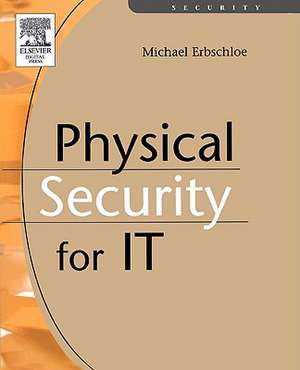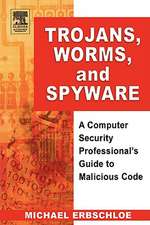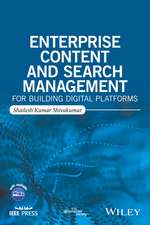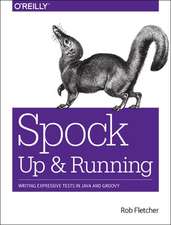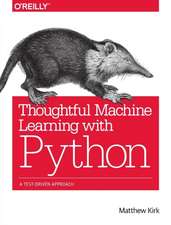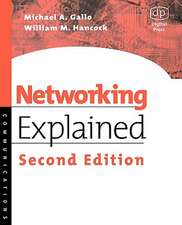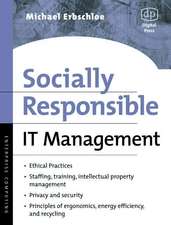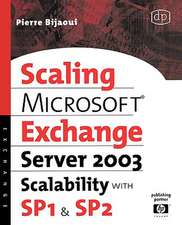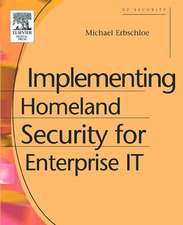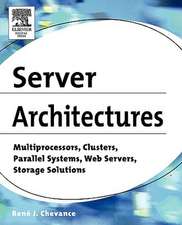Physical Security for IT
Autor Michael Erbschloeen Limba Engleză Paperback – 3 dec 2004
Even though the skill level required to hack systems and write viruses is becoming widespread, the skill required to wield an ax, hammer, or fire hose and do thousands of dollars in damage is even more common. Although many books cover computer security from one perspective or another, they do not thoroughly address physical security. This book shows organizations how to design and implement physical security plans. It provides practical, easy-to-understand and readily usable advice to help organizations to improve physical security for IT, network, and telecommunications assets.
* Expert advice on identifying physical security needs
* Guidance on how to design and implement security plans to prevent the physical destruction of, or tampering with computers, network equipment, and telecommunications systems
* Explanation of the processes for establishing a physical IT security function
* Step-by-step instructions on how to accomplish physical security objectives
* Illustrations of the major elements of a physical IT security plan
* Specific guidance on how to develop and document physical security methods and procedures
Preț: 453.04 lei
Preț vechi: 588.37 lei
-23% Nou
Puncte Express: 680
Preț estimativ în valută:
86.69€ • 90.75$ • 71.73£
86.69€ • 90.75$ • 71.73£
Carte tipărită la comandă
Livrare economică 05-19 aprilie
Preluare comenzi: 021 569.72.76
Specificații
ISBN-13: 9781555583279
ISBN-10: 155558327X
Pagini: 256
Dimensiuni: 191 x 235 x 14 mm
Greutate: 0.54 kg
Editura: ELSEVIER SCIENCE
ISBN-10: 155558327X
Pagini: 256
Dimensiuni: 191 x 235 x 14 mm
Greutate: 0.54 kg
Editura: ELSEVIER SCIENCE
Public țintă
IT managers, CSO’s, supervisors, and corporate security staff. Also, business managers that make some security related decisions, managers in smaller organizations that do not have full time security staff, students in management programs.Cuprins
The
physical
security
of
IT,
network,
and
telecommunications
assets
is
equally
as
important
as
cyber
security.
We
justifiably
fear
the
hacker,
the
virus
writer
and
the
cyber
terrorist.
But
the
disgruntled
employee,
the
thief,
the
vandal,
the
corporate
foe,
and
yes,
the
terrorist
can
easily
cripple
an
organization
by
doing
physical
damage
to
IT
assets.
In
many
cases
such
damage
can
be
far
more
difficult
to
recover
from
than
a
hack
attack
or
malicious
code
incident.
It
does
little
good
to
have
great
computer
security
if
wiring
closets
are
easily
accessible
or
individuals
can
readily
walk
into
an
office
and
sit
down
at
a
computer
and
gain
access
to
systems
and
applications.
Even though the skill level required to hack systems and write viruses is becoming widespread, the skill required to wield an ax, hammer, or fire hose and do thousands of dollars in damage is even more common. Although many books cover computer security from one perspective or another, they do not thoroughly address physical security. This book shows organizations how to design and implement physical security plans. It provides practical, easy-to-understand and readily usable advice to help organizations to improve physical security for IT, network, and telecommunications assets.
Even though the skill level required to hack systems and write viruses is becoming widespread, the skill required to wield an ax, hammer, or fire hose and do thousands of dollars in damage is even more common. Although many books cover computer security from one perspective or another, they do not thoroughly address physical security. This book shows organizations how to design and implement physical security plans. It provides practical, easy-to-understand and readily usable advice to help organizations to improve physical security for IT, network, and telecommunications assets.
Recenzii
"Michael
has
unquestionable
knowledge
about
how
organizations
today
are
linking
their
systems
across
enterprise-wide
networks
and
virtual
private
networks
(VPNs),
as
well
as
increasing
their
exposure
to
customers,
competitors,
browsers,
hackers,
and
physical
threats
to
the
facility
equipment
and
network(s).
This
book
will
show
you
how
each
connection
magnifies
the
vulnerability
to
attack.
This
book
also
provides
the
fundamental
knowledge
you
need
to
analyze
electronic
and
physical
risks
to
your
networks
and
systems."
—John
Vacca,
Author
of
numerous
computer
security
books
